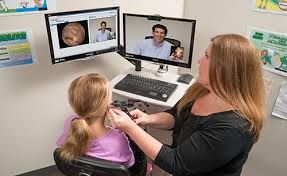
Telehealth to revolutionise life-saving cancer treatment
Video-conferencing may change the way rural and regional residents with deadly illnesses receive life-saving treatments in the future.
The study involving the Townsville Cancer Centre, Townsville Hospital and the Australian Institute for Tropical Health and Medicine at James Cook University compared the chemotherapy regimens delivered to TCC and Mt Isa Hospital cancer patients by city-based doctors between 2007 and 2012.
Results of the study found no difference in the dose intensity and toxicity profiles for patients undergoing chemotherapy in the Townsville tertiary cancer centre, and those treated via teleoncology at the rural Mount Isa Hospital with supervision from a medical oncologist.
TCC Director of Medical Oncology Associate Professor Sabe Sabesan said a total of 117 patients received 799 cycles of chemotherapy at the Townsville clinic while 89 patients received 626 cycles of treatment in Mount Isa.
During the project, the urban medical oncologists assessed rural patients and made decisions about their treatment using video conferencing tools such as Skype.
The remote medical treatments were supported by local doctors and nurses.
Associate Professor Sabesan said the study proved high-quality cancer care could be safely provided at rural centres instead of patients having to travel to major cities.
"Our study is the first to show that many types of chemotherapy can be administered in rural centres, without compromising safety and quality, by tele-oncology models of care," Associate Professor Sabesan writes in today's Medical Journal of Australia.
"By expanding the scope of practice and capabilities of rural health care systems through the use of tele-health models, rural patients may gain access to chemotherapy and other complex medical therapies similar to that of urban patients."



